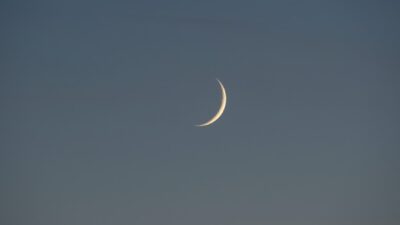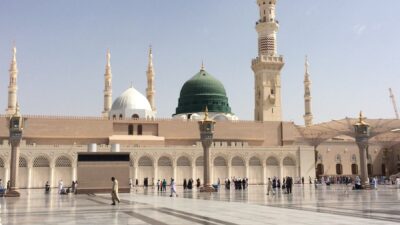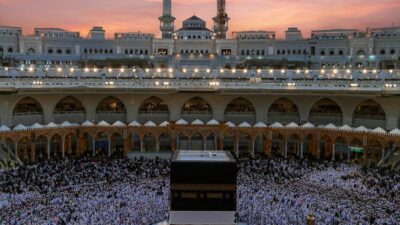Introduction
In this third part of our series on ‘Umar, we highlighted some of virtues and his amazing insight. In this final part we narrate the story of his martydom (may Allah be pleased with him)
His martyrdom; the narration of ‘Amr ibn Maymoon
‘ Amr ibn Maymoon said: “I was standing with no one between me and him but ‘Abdullah ibn ‘Abbas on the day when he was struck. When he passed between the rows, he would say, “Make (your rows) straight,” and when they were straight, he would go forward and say takbeer , and he would recite Soorah Yoosuf or an-Nahl, or a similar Soorah in the first rak‘ah, until all the people had gathered. No sooner had he said the takbeer, but I heard him say, “The dog has killed me!” when he was stabbed. The foreigner (non-Arab infidel) tried to flee, wielding a two-edged knife, and he did not pass by anyone, right or left, but he stabbed him. He stabbed thirteen people, of whom seven died. When one of the Muslim men saw that, he threw a cloak over him, and when the foreigner realized that he had been caught, he killed himself. ‘Umar took the hand of ‘Abdur-Rahman ibn ‘Awf and made him go forward to lead the people in prayer. Those who were immediately behind‘Umar saw what had happened; those who were in other parts of the mosque did not realize, but they missed ‘Umar’s voice, and they were saying, “Subhan-Allah.” ‘Abdur-Rahman led them in a brief prayer, and when they finished, ‘Umar said, “O’ Ibn ‘Abbas, see who killed me.” He went around for a while, then he came and said, “It was the slave of al-Mugheerah.” He asked, “The craftsman?” He said, “Yes.” He said, “May Allah curse him. I told his master to treat him well. Praise be to Allah, Who has not caused my death to be at the hands of a man who claimed to be a Muslim. You and your father (meaning al-‘Abbas and his son, ‘‘‘Abdullah) — wanted to bring more infidel foreigners to Madeenah!” Al-‘Abbas was the one who had the most slaves, and ‘Abdullah said, “If you wish (we will kill them).” ‘Umar said, “No, that is wrong, after they have learned your language and started to pray facing your qiblah, and performed Hajj as you do.”
‘Umar was carried to his house, and we set off with him, and it was as if no calamity had ever struck the people before. Some nabeedh was brought to him and he drank it, but it came out from his stomach. Then some milk was brought to him and he drank it, but it came out through his wound. They realized that he was dying, so we entered his house and the people came and started praising him. He said: “O’ ‘Abdullah ibn ‘Umar, see what debts I owe.” They worked it out, and the total came to eighty-six thousand or thereabouts. He said, “If the family of ‘Umar can afford it, pay it off from what you collect from them. Otherwise ask Banu ‘ Adiyy ibn Ka‘b, and if their wealth is not enough then ask Quraysh, but do not go to anyone else after them. Pay off this money on my behalf. And go to ‘A’ishah, the Mother of the Believers, and say, “ ‘Umar sends you greetings of peace. Do not say Ameer al-Mu’mineen , for today I am no longer the leader of the believers. Say, ‘Umar ibn al-Khattab is asking for permission to stay with his two companions.” ‘Abdullah ibn ‘Umar said salam and asked permission, then he went to her and found her sitting weeping. He said, “Umar ibn al-Khattab sends you salams and is asking for permission to be buried with his two companions.” She said, “I had wanted it for myself, but today I will give it up for him.” When he came back, it was said, “Abdullah ibn ‘Umar has come.” ‘ ‘Umar said, “Lift me up.” So a man helped him to sit up and he asked, “What news do you have?” He said, “That which you want to hear. O’ Ameer al-Mu’mineen. She has given permission.” He said, “Praise be to Allah, nothing was worrying me more than that. When I pass away, carry me there and say: “ ‘Umar ibn al-Khattab is asking permission to enter. When permission is given to me, carry me in, but if she says no, then take me to the graveyard of the Muslims.” When he died, we took him out and set off walking. ‘Abdullah ibn ‘Umar said salam and said, “Umar ibn al-Khattab is seeking permission to enter.” ‘A’ishah said, “Bring him in.” So he was brought in and placed there with his two companions .
Other reports
Some reports describe in detail the events that are not mentioned in the report of ‘Amr ibn Maymoon. Ibn ‘Abbas said: “ ‘Umar was stabbed before dawn by Abu Lu’lu’ah, the slave of al-Mugheerah ibn Shu‘bah, who was a Magian .” Abu Rafi‘ said, “Abu Lu’lu’ah was a slave of al-Mugheerah ibn Shu‘bah, and he used to make grindstones. Al-Mugheerah used to deduct four dirhams from him every day. Abu Lu’lu’ah met ‘Umar and said, ‘O ’ Ameer al-Mu’mineen, al-Mugheerah is taking too much from me; ask him to reduce it.’ ‘Umar said, ‘Fear Allah and be good to your master.’ ‘Umar intended to speak to al-Mugheerah and ask him to reduce it, but the slave got angry and said, ‘His justice extends to all of them except me. ’ So he planned to kill him. He made a two-headed dagger, sharpened it and put poison on it, then he showed it to al-Hormuzan, and asked, ‘What do you think of this?’ He said, ‘I do not think you will strike anyone with it but you will kill him .’ Then Abu Lu’lu’ah waited for an opportunity to strike ‘Umar. He came to him at the time of Fajr prayer and stood behind ‘Umar. As was his habit, when the iqamah for prayer was given ‘Umar spoke to the people and told them to straighten their rows, then when he said the takbeer, Abu Lu’lu’ah stabbed him in the shoulder and then in his side, and ‘Umar fell down .” ‘Amr ibn Maymoon said: “When he was stabbed, I heard him say, And the Command of Allah is a decree determined.
Forbidding the evil – even when dying
A young man came to ‘Umar after he was stabbed and told him: “O leader of the believers, you have glad tidings from Allaah, as you accompanied the Prophet sallallaahu `alayhi wa sallam and you are a senior in Islam, and then you were appointed as a caliph and you ruled with justice, and finally, you are blessed with martyrdom.” … Then ‘Umar : “I wish I would meet Allaah breaking even.” And when the young man departed away ‘Umar noticed that his lower garment was touching the ground. So, he asked people to call him and said to him: “O son! Raise your garment as, it is cleaner to your garment and reflects consciousness of Allaah.” [Al-Bukhari] The narration is evidence that he was keen on adhering to the Sunnah and warning people against neglecting it, and he advised the young man even in this very last moments of his life. (Bukhari)
The final moments
Ibn ‘Abbas described die final moments in the life of ‘Umar when he said: “I entered to see ‘Umar when he had been stabbed, and said, ‘Receive the glad tidings of Paradise, O’ Ameer al- Mumineen , for you became Muslim when the people disbelieved, and you strove in jihad with the Messenger of Allah when the people let him down. The Messenger of Allah died when he was pleased with you, no one disputed your appointment as caliph, and you have been killed as a martyr.’ ‘Umar said, ‘Say it again.’ So I repeated it to him, and he said, ‘By Allah, besides Whom there is no other god, if I had all the gold and silver in the world, I would pay it to avoid the terror of what comes after death.’”
According to a report narrated by Bukhari, “As for what you have said about having been a Companion of the Messenger of Allah and his having been pleased with me, that is a blessing that Allah has bestowed upon me. As for what you see of my worry, that is because I am worried about you and your companions. By Allah, if I had an earthful of gold, I would use it to ransom myself from the punishment of Allah before I saw it.”
‘Umar’s fear of Allah
‘Umar was profoundly afraid of the punishment of Allah even though the Prophet had testified that he was bound for Paradise; despite that he made great efforts to establish the rule of Allah and justice, was a great ascetic, engaged in jihad and did other righteous deeds. This offers an important lesson to the Muslims in general, that they should remember the stem punishment of Allah and the terrors of the Day of Judgement.
‘Uthman tells of the last moments in the life of ‘Umar, as he says: “I was the last of you to see ‘Umar. I entered to see him and his head was resting in the lap of his son ‘Abdullah ibn ‘Umar. He said to him: “Lay my cheek upon the ground.” He said, “Is there any difference between my thigh and the ground?” He said, “Lay my cheek on the ground, may you be bereft of your mother,” the second or third time. Then he crossed his legs and I heard him say, “Woe to me and woe to my mother if Allah does not forgive me,” then his soul departed.
This is an example of ‘Umar’s characteristic fear of Allah, for his last words were words of woe against himself if Allah did not forgive him, even though he was one of the ten who had been given the glad tidings of Paradise. But the one who knows more of Allah fears Allah more. His insistence that his son lay his cheek on the ground was a kind of humbling himself in order to glorify Allah, because that would be more likely to bring a response to his du‘a’. This shows us how much his heart was focused on Allah.
Adh-Dhahabi said: “He was martyred on a Wednesday, the twenty-sixth or twenty-seventh of Dhu al-Hijjah 23 A.H., and he was sixty-three years old according to the correct view.” His caliphate lasted a little more than ten and a half years . In Tareekh Abi Zar ‘ah it is narrated that Jareer al-Bajali said: “I was with Mu‘awiyah and he said, ‘The Messenger of Allah (jig) died when he was sixty-three years old, and Abu Bakr died when he was sixty-three years old, and ‘Umarwas killed when he was sixty-three years.
His Janaza
Adh-Dhahabi said that Suhayb ibn Sinan offered the prayer for him. Ibn Sa‘d said: “ ‘Ali ibn al-Husayn asked Sa‘eed ibn al- Musayyib, ‘Who offered the funeral prayer for ‘Umar ?’ He said, ‘Suhayb.’ He said, ‘How many takbeers did he say?’ He said, ‘Four.’ He asked, ‘Where was the prayer offered?’ He said, ‘Between the grave and the minbar.’” Ibn al-Musayyib said: “The Muslims looked and saw that Suhayb was leading them in the obligatory prayers, on the instruction of ‘Umar, so they made him lead the funeral prayer for ‘Umar.” ‘Umar did not appoint any of the six candidates for the caliphate to lead the prayer, lest that be seen as an endorsement of that man by ‘Umar.
His burial
Adh-Dhahabi said: “He was buried in the room where the Prophet was buried. Ibn ‘Abbas said: “ ‘Umar was placed on his bed and the people surrounded him, praying for him before he was lifted up, and I was among them. Suddenly I felt a man taking hold of my shoulder and it was ‘Ali ibn Abi Talib. He prayed for mercy for ‘Umar, then he said, ‘There is no one that I would love to meet Allah with deeds like his more than you. By Allah, I always thought that you would join your two companions, for I remember that I often heard the Prophet say, ‘Abu Bakr, ‘Umar and I went; Abu Bakr, ‘Umar and I entered”.
The tomb of Abu Lu’lu’ah al-Majoosi- the killer of ‘Umar

Sayyid Husayn al-Musawi, one of the Shi’i scholars of an-Najaf, says: “In the Iranian city of Kashan, in an area called Baghi Feen, there is a shrine like that of the ‘Unknown Soldier’ in which there is a fabricated grave for Abu Lu’lu’ah Fayrooz al-Farisi al-Majoosi, the murderer of the second caliph ‘Umar ibn al-Khattab. They call it the ‘resting place of Baba Shuja‘ ad-Deen’. (roughly translated as ‘the honored, brave defender of the religion’). Baba Shuja‘ ad-Deen is the name that they bestowed upon Abu Lu’lu’ah for his having killed ‘Umar ibn al-Khattab. On the walls of this shrine it is written in Farsi, ‘Marg bar Abu Bakr, marg bar ‘Umar, marg bar ‘Uthman ,’ which means ‘Death to Abu Bakr, death to ‘Umar, death to ‘Uthman’. The shrine is visited by the Iranian Shi‘ah, and money and donations are given to it. The Iranian Ministry of Guidance has started to expand and renovate it, and they have printed pictures of the shrine on cards to be used for sending greetings and messages.
This article was primarily based on ‘Umar al-Khaṭṭāb. His life and times by Dr. Ali M. Sallabi





